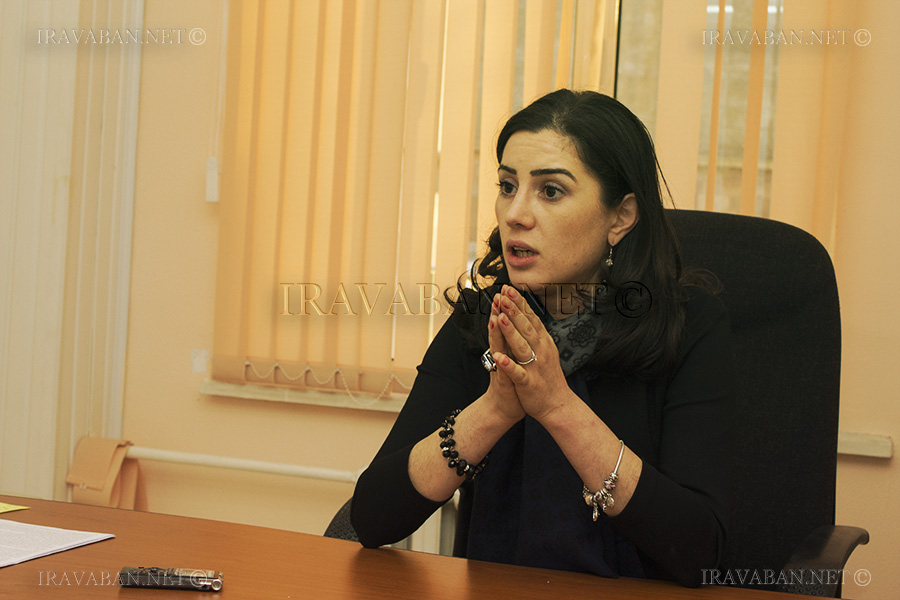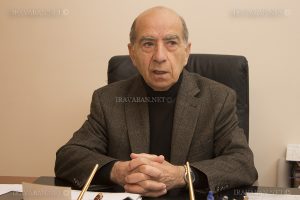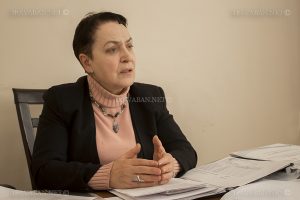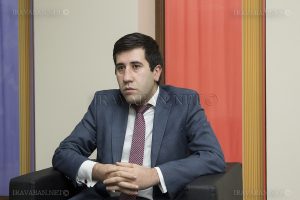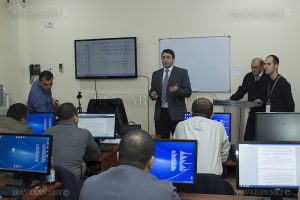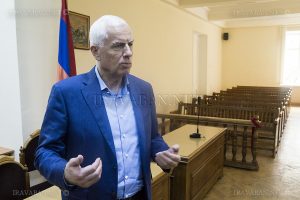Nora Sargsyan, Head of the “Law” Chair of French University Foundation in Armenia, Pedagogical Coordinator of the Law Department says that today corruption is not the main problem which the faculty and the university in general face. It is even improper to speak about this in this university. There is a more actual and concerning problem here. What education does the university render to the students, what is more concerning than the corruption and why does the faculty on one hand struggling for improving the quality of education and on the other hand faces resistance. Details in the regular interview of the special project “Higher Education Law Institutions in Armenia”.
Ms Sargsyan, please briefly describe the faculty.
First about the university, it is in essence the best example of the Armenian-French cooperation. The university’s academic strengths and potential is concentrated in 4 specialties direction, law, management, marketing, banking and insurance. Each department has one chair. For example, Faculty of Law, a Chair Law, which is coordinating the work of all lecturers and the so-called head of the department, is called the head of the Chair or the Pedagogical Coordinator of the Law Department. We do not have the classic notion of “Chair”; therefore the head of the Chair is consistent with the dean of the Department. The University is a Foundation, which was established by the Governments of Armenia and France, represented by the Ministry of Education and Science and the Ministry of Foreign Affairs, French Ministry of Foreign Affairs and the French Embassy. As a result of University education, students receive two types of diplomas, the Armenian and French national diplomas of the Armenian Bachelor’s degree and French License – State diploma provided by the partner University, its academic partner, Jean Moulin University Lyon III. After completing the master’s program, respectively the Armenian Master degree, as well as French Master degree State diplomas. It is due to mention that Jean Moulin University Lyon III is one of the leading universities in that country, and its law department is greatly respected there. We always have lecturers from the French partner university who come to our university to deliver lecturers in our faculty. Starting from the second to third year of education the Masters course of our university always hosts at least 4 French lecturers who deliver lectures in French language.
Which branch representatives of law are trained in your university?
The Law faculty of UFAR has particular specialization; of course it is not included largely in the Bachelors course, because that course mainly includes general legal education and the basic legal disciplines are thought. Whereas the Masters course has a distinct direction MA in International Trade Law. Given the direction of the master’s program, in terms of continuity of education, we organize the bachelors education in a manner where the emphasis is made on the disciplines of private law, civil, banking, business law, tax law, etc.
How are the entrance exams organized?
Our university has its own entrance exam procedure. They are not implemented in the same manner as other in other universities. One of the specificities of our faculty is that, unlike other universities, UFAR is one of the exceptional educational institutions where in order to enter the law department the entrants have to pass an exam on the basics of law. This means that we are choosing our students through checking their legal knowledge based on inspection of the school textbook social studies. When the student enters the university, he already has some understanding of the legal profession and basics of legal knowledge. This helps the first-year students to study the professional disciplines.
Which is the peculiarity of your faculty?
There are certain traditions, but also drawbacks: first, the issue of teaching methodologies. The fact that we use the services of the French professors, also allows us to improve this system. First, the students do study; they become even more demanding to methods of teaching, which enables us to improve our professors. In addition, one of the advantages is that the organization and conducting of examinations is anonymous, this fact deters a lot of subjective factors. When checking the student’s work, the Lecturer only sees the notebook. The names are revealed only after the assessment, ands only for the administration, that is the professor does not know the student’s name even after assessing. This fact contributes to making the exams as objective as possible.
When choosing the list of disciplines to be taught in our faculty we base on the curricula of Jean Moulin University Lyon III, it allows us to take ideas and interesting disciplines from them. We put emphasis on the basis of performance practice of providing education and training of the professionals according to market demand. Jurisprudence is a very practical science, although the existence of theory should not be underestimated, but of course, theoretical knowledge must always be supplemented with practice, so that the students are able to understand how to apply theoretical knowledge in practice. One interesting thing about us is that the practice of the students is organized in a rather interesting manner. First, the best 4th year students have the opportunity to pas internship in France. We have partner organizations, including the French lawyers who assist us in this matter. The University covers all the costs of the students. As for the internship in Armenia, we are very attentive so that the student does not just get his present and returns home. As a result of the practice the students write a report, where they describe what they did at practice and specific legal analysis of what they have done for the organization. As a rule, employers have the opportunity to select those students who want to take for internship. The practice shows that these students often are admitted to work in those organizations.
You also talked about the fact that you invite French university professors. Prior to our interview, I have talked to your students, who noted that the French lecturers taught just for three days, during which they hastily provide extensive materials. Don’t you want to extend the terms of their teaching making them let’s say a week or a month?
Of course, it is much more desirable that they come over for a longer periods of time, but I have to note that according to our calculations, even if we extend it for one day it will require a lot of costs in Armenia. The issue is not only about one professor. Of course we would like to have more experts to come, the issue is not that they are the best, we also have excellent local professionals and should not underestimate them, but it is always interesting to communication with the outside world. At present the French University in Armenia is one of the outstanding universities, which involves so many foreign specialists in the organization of its educational course. Moreover, if we have extra money, it is probably more appropriate to correct and improve the quality of local lecturers have our own team of qualified personnel.
Corruption is one of the vicious problems in Armenian universities. Are there corruption risks in the faculty? If “yes”, how do you fight against it?
This is a serious challenge for our country. I can say with confidence, even if there is such a thing in our university, then it is extremely subtle, if you ask our students, perhaps no one will say that they get they marks for money or witnessed such a phenomenon. I mentioned that the examination processes are strict. We have an oral exam, it is extremely important. Students often say let’s hold oral exams, but this model is extremely subjective. Even when some state examinations are conducted orally, all examinations are videotaped, and then studied. The control is maximized. In addition, our professors also work in other places, so that they do not rely on the student’s fee. There is another problem is becoming more and more uncontrollable and topical today than the corruption. Modern technologies that allow students to explore various frauds to get the mark.
Are such occurrences common in the French University?
Yes, unfortunately. We left our core academic work aside, and today are acting as the police. For example, there are a number of websites whose motto is roughly as follows, “Why prepare for exams, if it is possible to use these devices.” These devices are even given for rent times during the examination period. For example, microscopic earphones that are put into the ear and transfer the test. During the exams we have special controllers who are invited people. We also placed video cameras, jammers, we apply very strict sanctions in case of revealed violation, but still we have not achieved one hundred percent successful fight against this phenomenon. During the past years about 15 students were excluded from the University for copying using the earphones. Here the state has to fight against the preachers and importers of such devices. This became a global problem threatening the objectivity of the educational process; universities alone cannot fight against it. Today this is a problem rather than the corruption. Moreover, when such mildly speaking unfair students are punished the, parents often do not even realize that this is done in the interest of their child, for them to receive a prestigious diploma and advanced knowledge.
Let’s speak about the issue of providing diplomas. I have heard concern of your graduates that the diplomas provided rather late. It is clear in case of the French diploma; it should be approved in France and then be provided to the student, but why the Armenian diploma is coming late? For example the student has graduated in July and has not yet received his diploma.
We have a diploma awarding ceremony. In France, diplomas of all graduates must personally be sign by the education minister. Imagine the huge France, and how many universities it has and the number of graduates. There is no need to worry; no graduates have stayed without a diploma. It is a technical problem, however, guarantees the reliability of the granted diplomas. Moreover, before the diplomas are ready, the students are provided with a document certifying the successful completion of the university. I myself am a graduate of an English university, the process of providing the diplomas there is a rather long as well.
Interview: Gevorg Tosunyan
Photos: Aleksander Sargsyan
Author of the idea: Karen Zadoyan
Other interviews of this series:
“Firstly Gain a Face, then Present Oneself”. Ruben Melikyan

